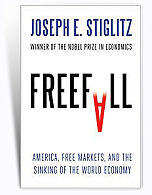|
||
podział tematyczny • wydawnictwa anglojęzyczne podział tematyczny Newsletter: • Zamów informacje o nowościach z wybranego tematu Informacje: • sposoby płatności i dostawy • kontakt • Cookies na stronie • Regulamin zakupów Napisz propresssp@gmail.com |
FREEFALL: AMERICA FREE MARKETS AND THE SINKING OF THE WORLD ECONOMYSTIGLITZ J.E.wydawnictwo: NORTON W.W. & COMP. , rok wydania 2010, wydanie Icena netto: Freefall: America, Free Markets, and the Sinking of the World EconomyAn incisive look at the global economic crisis, our flawed response, and the implications for the world’s future prosperity. The Great Recession, as it has come to be called, has impacted more people worldwide
than any crisis since the Great Depression. Flawed government policy and unscrupulous
personal and corporate behavior in the United States created the current financial
meltdown, which was exported across the globe with devastating consequences. The crisis
has sparked an essential debate about America’s economic missteps, the soundness of this
country’s economy, and even the appropriate shape of a capitalist system. The New York Times - Kevin PhillipsFreefall has three standout strengths. First, it is a powerful indictment of Wall Street, the United States financial sector and the Federal Reserve Board. Second, it offers a reluctant but persuasive elaboration of how the Obama administration decided to embrace the financial sector and the Fed, continuing and enlarging both the bailout and the too-big-to-fail philosophy that it inherited from George W. Bush. Finally, it is a blunt attack on Stiglitz's own profession, for transforming "scientific discipline" into "free-market capitalism's biggest cheerleader"…Stiglitz's virtue is that he minces few words. 400 pages, Hardcover Księgarnia nie działa. Nie odpowiadamy na pytania i nie realizujemy zamówien. Do odwolania !. |


